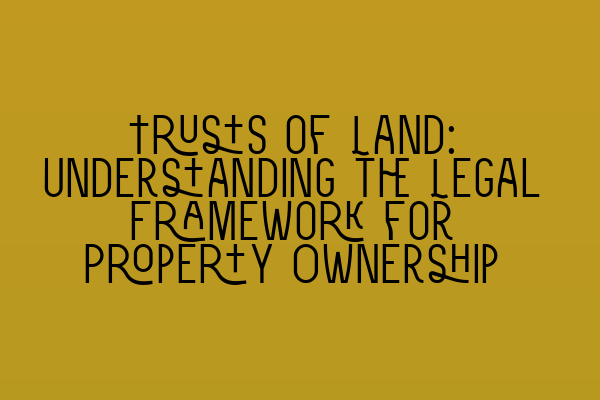Trusts of Land: Understanding the Legal Framework for Property Ownership
Welcome to SQE Property Law & Land Law, where we specialize in providing expert guidance and legal services in property law matters. In this blog post, we will delve into the intricate world of Trusts of Land and explore the legal framework surrounding property ownership. If you want to develop a thorough understanding of this complex subject, you’re in the right place.
Before we dive into the details, let’s take a moment to familiarize ourselves with some related concepts. If you haven’t already, we highly recommend checking out our previous articles on SQE Contract Law: Analyzing Landmark Cases and Influential Judicial Decisions, Understanding Contractual Capacity: Rights and Limitations, Interactive SQE Mock Tests for Contract Law: Test Your Knowledge, Join Our SQE Contract Law Webinars: Expert Insights and Guidance, and SQE Prep: Mastering the Essentials of Contract Law.
Now, let’s jump into the fascinating world of Trusts of Land. A Trust of Land occurs when property is held by one or more individuals (known as trustees) for the benefit of another or others (known as beneficiaries). It’s important to understand that a Trust of Land can arise through an express trust, such as a trust created in a written document, or through an implied trust, where the circumstances surrounding the property ownership suggest the existence of a trust relationship.
Why would someone opt for a Trust of Land? The reasons can vary. For instance, a Trust of Land may be established to ensure that the property is managed or utilized for the benefit of specific individuals, such as family members or charitable organizations. It can also be a way to protect assets from creditors or to facilitate the efficient distribution of property upon the death of the owner.
However, it’s crucial to remember that Trusts of Land are subject to numerous legal regulations and obligations. The Trustee Act 2000, which outlines the duties and powers of trustees, and the Trusts of Land and Appointment of Trustees Act 1996 (TOLATA) are two key statutes governing this area of law. These acts provide the framework for resolving disputes, determining the respective rights and interests of beneficiaries and trustees, and facilitating the management and administration of trust property.
When dealing with Trusts of Land, it’s essential to distinguish between the legal and beneficial ownership of the property. The legal owner holds the property on trust for the beneficiaries, who have equitable interests in the property. Understanding this distinction is pivotal when it comes to resolving disputes and determining the rights and responsibilities of the parties involved.
Disputes involving Trusts of Land can arise in various scenarios. For instance, conflicts may arise between trustees and beneficiaries over the management or use of the property. Disagreements can also occur when beneficiaries have conflicting interests or varying interpretations of their rights. In such cases, the court can be approached to assist in resolving the dispute and ensuring a fair outcome for all parties.
As a solicitor specializing in property law, it’s crucial to have a solid grasp of the legal framework surrounding Trusts of Land. This includes understanding the relevant legislation, case law, and the factors courts consider when determining the validity and interpretation of trusts. Being able to analyze and apply landmark cases and influential judicial decisions, as covered in our article on SQE Contract Law: Analyzing Landmark Cases and Influential Judicial Decisions, will enable you to offer sound legal advice and representation to your clients.
In conclusion, Trusts of Land play a vital role in property ownership and provide a legal framework for ensuring the fair and effective management and use of property. From understanding the legal and beneficial ownership concepts to navigating the complexities of trust disputes, a comprehensive understanding of this area of law is essential for solicitors specializing in property law.
If you’re looking to enhance your knowledge and skills in property law or other areas of law covered in the SQE exam, consider checking out our range of resources at SQE Property Law & Land Law. Explore our interactive SQE mock tests, SQE Contract Law webinars, and SQE Prep courses designed to help you master the essentials and excel in your legal career.
Remember, at SQE Property Law & Land Law, we’re here to support your journey in becoming a successful solicitor. Stay tuned for more insightful articles, expert guidance, and updates in property law.
